
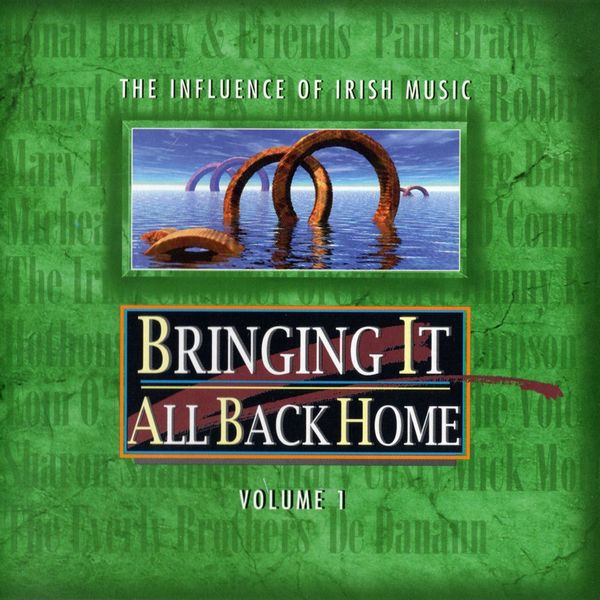 |
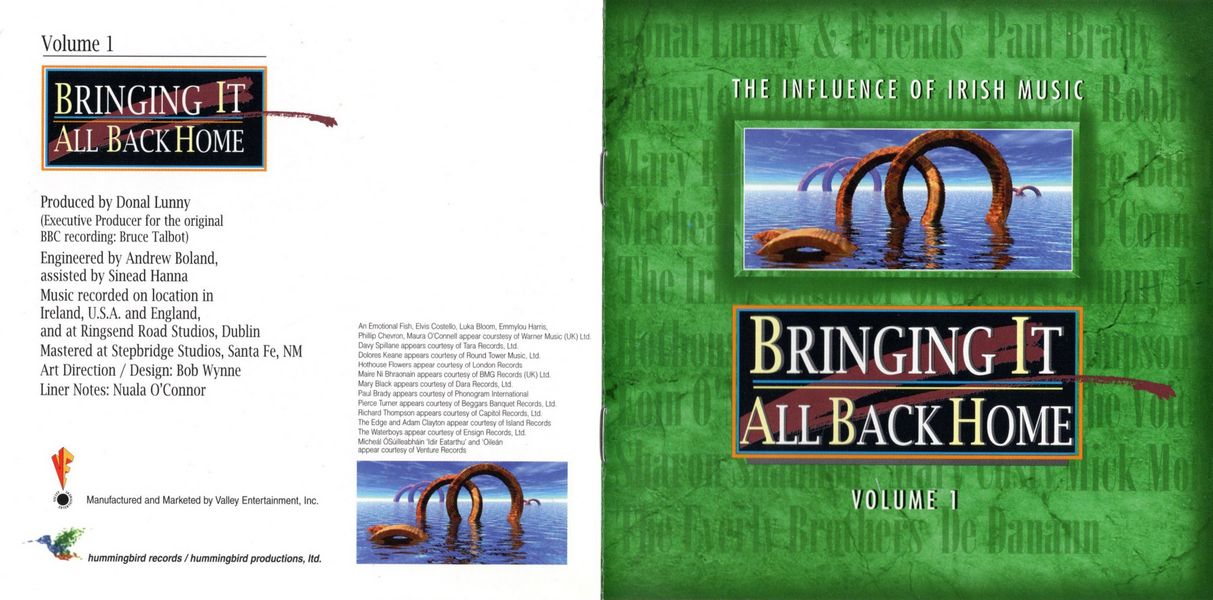
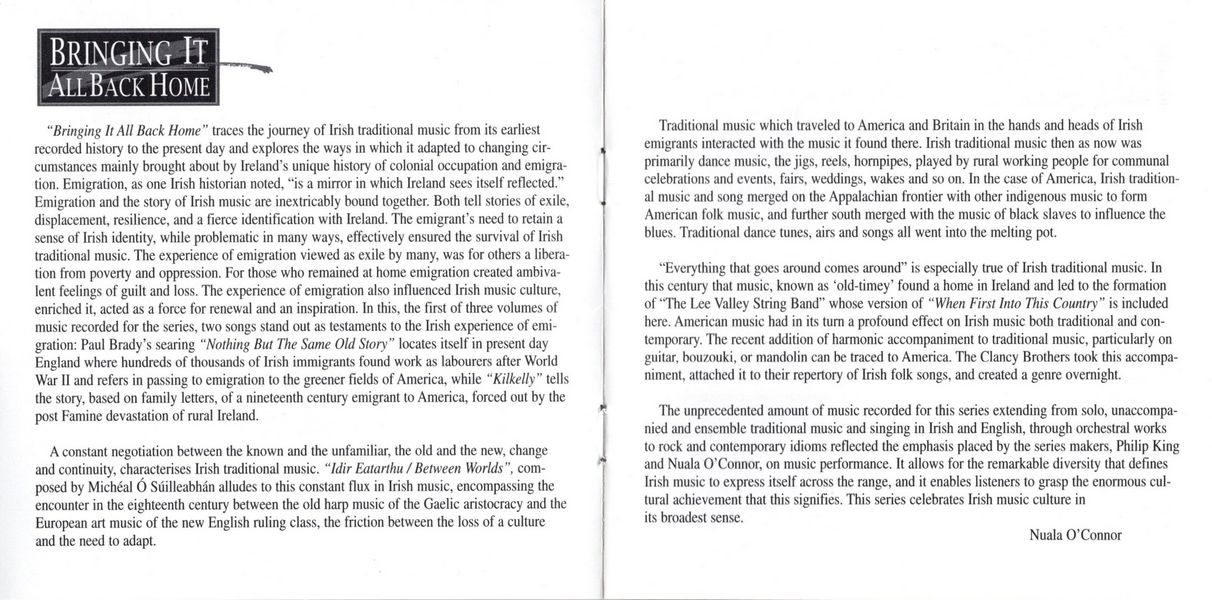 |
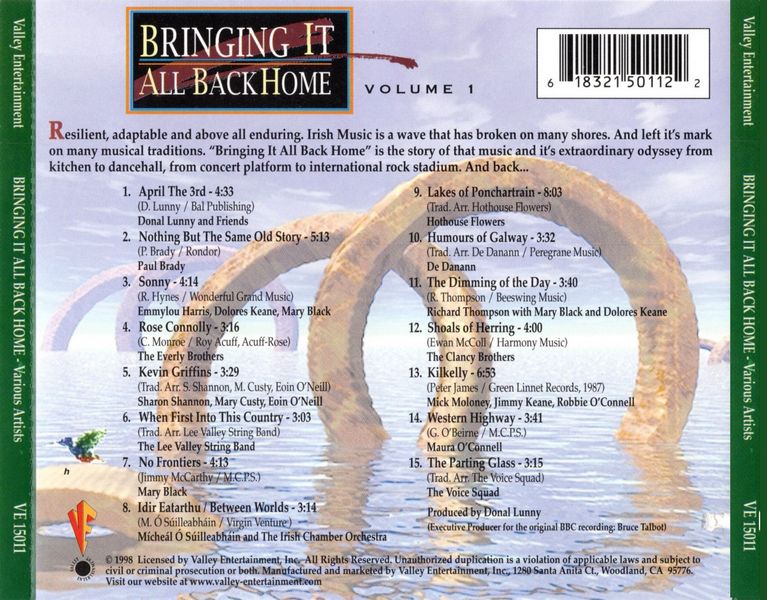
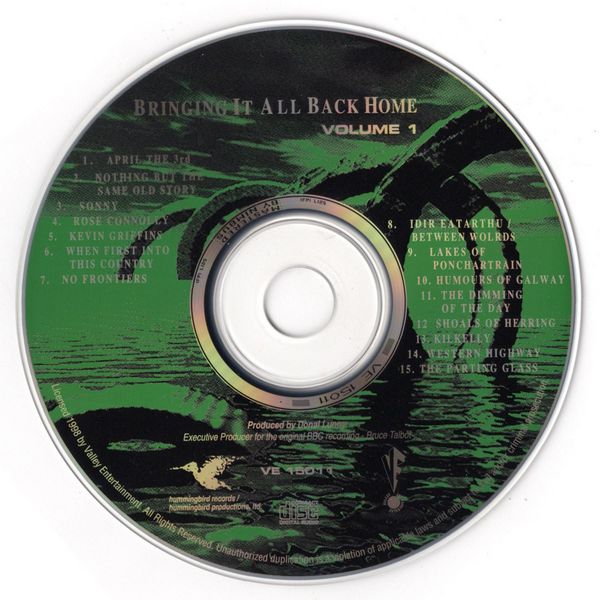 |
| more images |
Sleeve Notes
"Bringing It All Back Home" traces the journey of Irish traditional music from its earliest recorded history to the present day and explores the ways in which it adapted to changing circumstances mainly brought about by Ireland's unique history of colonial occupation and emigration. Emigration, as one Irish historian noted, "is a mirror in which Ireland sees itself reflected." Emigration and the story of Irish music are inextricably bound together. Both tell stories of exile, displacement, resilience, and a fierce identification with Ireland. The emigrant's need to retain a sense of Irish identity, while problematic in many ways, effectively ensured the survival of Irish traditional music. The experience of emigration viewed as exile by many, was for others a liberation from poverty and oppression. For those who remained at home emigration created ambivalent feelings of guilt and loss. The experience of emigration also influenced Irish music culture, enriched it, acted as a force for renewal and an inspiration. In this, the first of three volumes of music recorded for the series, two songs stand out as testaments to the Irish experience of emigration: Paul Brady's searing "Nothing But The Same Old Story" locates itself in present day England where hundreds of thousands of Irish immigrants found work as labourers after World War II and refers in passing to emigration to the greener fields of America, while "Kilkelly" tells the story, based on family letters, of a nineteenth century emigrant to America, forced out by the post Famine devastation of rural Ireland.
A constant negotiation between the known and the unfamiliar, the old and the new, change and continuity, characterises Irish traditional music. "Idir Eatarthu/Between Worlds", composed by Michéal Ó Súilleabhán alludes to this constant flux in Irish music, encompassing the encounter in the eighteenth century between the old harp music of the Gaelic aristocracy and the European art music of the new English ruling class, the friction between the loss of a culture and the need to adapt.
Traditional music which traveled to America and Britain in the hands and heads of Irish emigrants interacted with the music it found there. Irish traditional music then as now was primarily dance music, the jigs, reels, hornpipes, played by rural working people for communal celebrations and events, fairs, weddings, wakes and so on. In the case of America, Irish traditional music and song merged on the Appalachian frontier with other indigenous music to form American folk music, and further south merged with the music of black slaves to influence the blues. Traditional dance tunes, airs and songs all went into the melting pot.
"Everything that goes around comes around" is especially true of Irish traditional music. In this century that music, known as 'old-timey' found a home in Ireland and led to the formation of "The Lee Valley String Band" whose version of "When First Into This Country" is included here. American music had in its turn a profound effect on Irish music both traditional and contemporary. The recent addition of harmonic accompaniment to traditional music, particularly on guitar, bouzouki, or mandolin can be traced to America. The Clancy Brothers took this accompaniment, attached it to their repertory of Irish folk songs, and created a genre overnight.
The unprecedented amount of music recorded for this series extending from solo, unaccompanied and ensemble traditional music and singing in Irish and English, through orchestral works to rock and contemporary idioms reflected the emphasis placed by the series makers, Philip King and Nuala O'Connor, on music performance. It allows for the remarkable diversity that defines Irish music to express itself across the range, and it enables listeners to grasp the enormous cultural achievement that this signifies. This series celebrates Irish music culture in its broadest sense. Nuala O'Connor
April the 3rd: This is a new dance tune written by Dónal Lunny. It is the theme music for "Bringing It All Back Home" and mixes the old rhythms of Irish Dance Music with modern rhythmic and percussive elements. The title comes from the fact that it was written on that date, and recorded in Ringsend Road Studios, Dublin, on Tuesday 10th April 1990, with Dónal Lunny on bouzouki and bodhran; Hossam Ramsey, percussion; Noel Eccles, percussion; Paul Moran, percussion; Tony Molloy, bass; A.N. O'Ther, electric guitar; Anto Drennan, electric guitar, Nollaig Casey, fiddle; Ronan Browne, uileann pipes; James Delaney, keyboards.
Nothing But The Same Old Story — Paul Brady hails from Strabane, Co. Tyrone in Northern Ireland. His musical influences go from Hank Williams, Jerry Lee Lewis and Chuck Berry to the traditional Irish musicians of his native Ulster. Paul attributes his unique singing style to the fact that for 10 years he did nothing but play Irish music. Much of this Irish music was learned and played by Paul in the London of the early 1960s. The song Nothing But The Same Old Story reflects his experiences and the experiences of the Irish Community of which he was a part at that time. Donal Lunny is on bouzouki and Paul on acoustic guitar and vocals.
Sonny — Emmylou Harris expressed a wish to sing with Dolores Keane and Mary Black. She felt there was something in the spirit of their singing that she could relate to. It wasn't so much the words or even the tunes, it was just the feeling that they were coming from the same place as herself. As it transpired, she was right. They met in Nashville, Tennessee, and sang together for the first time. The musicians for Sonny are Emmylou Harris, Dolores Keane and Mary Black, vocals; Pat Crowley, accordian; Liam O'Flynn and Davy Spillane, uileann pipes; Roy Huskey, Jr., bass; Mark O'Connor, fiddle.
Rose Connolly — First collected by Edward Bunting in Coleraine, Co. Derry in the northern part of Ireland. Like many songs which have their origins there, this one made its way to the United States, where now there are 70 known versions. The version here made its way to Kentucky and is sung by The Everly Brothers, who learned it from their father Ike. They are joined by the great Irish uileann piper Liam O'Flynn, Roy Huskey, Jr. on bass and Phillip Donnolly on acoustic guitar.
Kevin Griffins — It is common in Ireland that musicians will name the tunes they play after the musician from whom they learned them. This selection, therefore, is named after the banjo player Kevin Griffin and is played by Mary Custy, fiddle; Sharon Shannon, accordian and Eoin O'Neill, bouzouki.
When First Into This Country — Irish Music traveled to the United States and influenced the development of Oldtimey, Blue Grass and Country Music. This music has come back to Ireland and The Lee Valley String Band who hail from the city of Cork in the southern part of Ireland, play Oldtimey and Appalachian music. The unique sound of voice, autoharp, fiddle, mandolin, bass and flatpick guitar are redolent of Bill Monroe and his Bluegrass Boys and The New Lost City Ramblers.
No Frontiers — Mary Black is regarded by many as one of Ireland's finest singing talents. Her roots are in traditional singing which again has contributed to her unique interpretation of contemporary ballads. No Frontiers, written by Jimmy McCarthy, is performed by Mary and her band for "Bringing It All Back Home".
Idir Eatarthu/ Between Worlds — This piece is based on an old English "pop" song called Jockey to the Fair, which came into the Irish tradition as a single jig. Micheál Ó Súilleabháin transposed it from jig to hornpipe and the orchestras joined by Tommy Hayes playing bodhran and bones, while Micheál plays piano.
Lakes Of Ponchartrain — This song has been recorded by Christy Moore and Paul Brady and it was from these versions that Hothouse Flowers learned the song. It tells the story of how a wandering Irishman down on his luck was taken in by a Creole family on the banks of Lake Ponchartrain.
Humours Of Galway — This selection of Irish Dance tunes is performed by Frankie Gavin, fiddle; Alec Finn, bouzouki and Colm Murphy, bodhran — of De Danann.
The Dimming of The Day — Richard Thompson was a founding member of Fairport Convention, one of the first electric folk bands to popularise traditional songs and dance tunes and bring them to a new audience. Richard Thompson is arguably one of the world's great song writers. He first recorded The Dimming of The Day on the 1975 Richard and Linda Thompson album "Pour Down Like Silver". This version was recorded at Jack Clement's Studios in Nashville with Mary Black and Dolores Keane adding vocal harmonies, Declan Sinnot on guitar; Pat Crowley on accordian; Roy Huskey, Jr. on bass.
Shoals Of Herring — This song was written by Ewan McColl. Liam, Bobby, Paddy and the late Tom Clancy performed this version, McColl's sea-shanty, at the home of Paddy Clancy, Co. Waterford — a song the Clancy Brothers made their own.
Kilkelly — 130 years after his great grandfather left the small village of Kilkelly in Co. Mayo, Peter Jones found a bundle of letters sent to his great grandfather by his father in Ireland. The letters tell of family news, births, deaths, sales of land and bad harvests. They remind the son that he is loved, missed and remembered by his family in Ireland. The final letter informs him that his father, who he has not seen for 30 years, has died, the last link with home is broken. Peter Jones used these letters to make a song called Kilkelly. The song was passed on to 3 musicians, Mick Moloney, Jimmy Keane and Robbie O'Connell who live in the United States and play music with a strong traditional base. Kilkelly is emblematic of the kind of immigrant culture they try to bring out in their music.
Western Highway — Maura O'Connell comes from Co. Clare on the west coast of Ireland. She began her musical career singing with the group De Danann. Western Highway was written by Gerry O'Beirne. Arty McGlynn is on guitar, and Nollaig Casey on fiddle.
The Parting Glass — Unaccompanied singing is a great part of of the Irish tradition. The Voice Squad, Fran McPhail, Phil Callery and Gerry Cullen, are making sure that the tradition will never die. They seek out and collect songs from all parts of the country and from England and treat them in their unique way. As they say themselves, they save songs from extinction. The Parting Glass, a poignant ballad of parting, is sung for us in 3-part harmony.